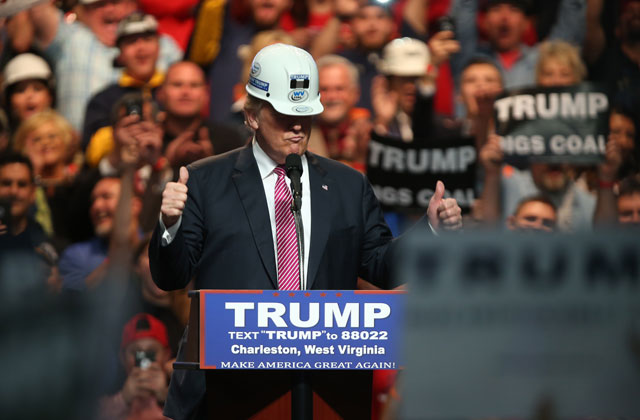
Did you know that Truthout is a nonprofit and independently funded by readers like you? If you value what we do, please support our work with a donation.
This story was originally published by Reveal from The Center for Investigative Reporting, a nonprofit news organization based in the San Francisco Bay Area. Learn more at revealnews.org and subscribe to the Reveal podcast, produced with PRX, at revealnews.org/podcast.
The Trump administration is fundamentally reshaping the nation’s approach to workplace safety, scrapping Obama-era protections and tools intended to hold dangerous companies accountable.
Some of these rollbacks have hewed to the National Association of Manufacturers’ agenda.
For example, finding out about workers’ injuries and deaths now is harder to do because of changes under the Trump administration. In March, President Donald Trump signed a resolution, after it narrowly passed Congress, that companies vying for large federal contracts no longer had to disclose labor violations, including workplace safety penalties.
The manufacturers association previously urged lawmakers to revoke what it called the “blacklisting” rule for federal contractors. Goodyear Tire & Rubber Co., the focus of a Reveal investigation into the company’s lax approach to safety, is a regular recipient of contracts with the Defense Department.
During his first week in office, Trump invited manufacturers to propose ways to cut “regulatory burdens.” The manufacturers association responded by submitting its wish list March 31.
That same day, Trump met with members of the manufacturers’ association at the White House.
“My administration is working every day to make it easier for manufacturers to build, hire and grow in America,” Trump said. “We’re removing job-killing regulations and lifting the burdens on American industry like I would say have never been lifted before.”
Earlier this year, Rosario Palmieri, a former top official with the National Association of Manufacturers, joined an obscure White House agency called the Office of Information and Regulatory Affairs that reviews federal regulations. The office will be instrumental in carrying out Trump’s goal to roll back federal regulations.
Just days after he was sworn in, Labor Secretary Alexander Acosta spoke by phone with Jay Timmons, the president and chief executive officer of the National Association of Manufacturers, according to Acosta’s appointment calendar. The pair met for lunch a week later at Charlie Palmer Steak, a downtown Washington steakhouse that bills itself as DC’s “definition of power lunching.”
The following week, the Occupational Safety and Health Administration, which is a part of the Labor Department, postponed the deadline for certain employers to submit logs showing the number of workers who suffer injuries and fall ill. The agency says it plans to collect some of this data by Friday.
The association’s wish list had asked the administration to kill the rule, which critics say would limit OSHA’s ability to target dangerous companies for investigations.
“The rule does nothing to enhance the safety and health of the workforce, therefore, the Administration should rescind this rule,” the association wrote.
In 2014, the association wrote to David Michaels, then OSHA’s administrator, claiming that prodding employers into providing safe workplaces by disclosing their injury data “fits squarely in the agency’s current enforcement theory of ‘regulation by shaming.’ “
In a policy paper, the manufacturers association urged OSHA to stop “publicly shaming employers. … Manufacturers believe that collaborating on the best way to remedy issues would be a better approach than focusing on only negative actions.”
Ashamed or not, employers then caught a break in late August when OSHA removed specific information about work-related fatalities from its homepage. The list included the names and circumstances of each person’s death.
In its place, under a new section titled, “OSHA working with employers,” the agency posted information about compliance programs that recognize companies with good workplace safety records.
“Compliance assistance I think is very important,” Acosta told a Senate subcommittee on June 27. “We need enforcement to go hand in hand, but compliance assistance at the end of the day I believe can bring about sometimes greater compliance.”
The National Association of Manufacturers did not respond to requests for comment.
At a meeting of the National Association of Manufacturers at a Washington hotel in September, Trump hammered a point he’d made previously: “My administration is working every day to lift the burdens on our companies and on our workers so that you can thrive, compete and grow.”
But posting information about fatalities and injuries encourages companies to protect their workers, making them more productive and profitable, said Michaels, who now is a professor at George Washington University’s Milken Institute School of Public Health.
“There is no evidence that putting information up is bad for a company,” Michaels said. “Fatalities and serious injuries are a sign of the management failure. Poorly managed companies are not as profitable as well-managed companies.”
Speaking against the authoritarian crackdown
In the midst of a nationwide attack on civil liberties, Truthout urgently needs your help.
Journalism is a critical tool in the fight against Trump and his extremist agenda. The right wing knows this — that’s why they’ve taken over many legacy media publications.
But we won’t let truth be replaced by propaganda. As the Trump administration works to silence dissent, please support nonprofit independent journalism. Truthout is almost entirely funded by individual giving, so a one-time or monthly donation goes a long way. Click below to sustain our work.